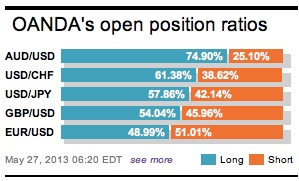The last week of May sees the release of a slew of Japanese April data including industrial production, consumer prices, retail sales, household spending and unemployment. The market should expect that most of the releases would get extra attention, as investors will want to gauge how Abenomics is doing on the World’s third-largest economy. Elsewhere, inflation numbers will dominate the Euro-zone and Germany’s agenda. While Stateside, the world’s longest Central Bank Governor goodbye gets to draw its final breath this week with new BoE Governor Carney presiding over his last Bank of Canada meet on Tuesday. The market does not expect any “show-boating” on the rate side of things ahead of the Canadian economy getting to release it’s first-quarter GDP results this coming Friday.

Day’s like today have investors seeking refuge in ‘any’ market information so as to break the tedious movement within most asset classes while two of the world’s largest financial centers take a holiday. The US and UK markets are officially closed. Despite this, the investor does get to see what is happening in mainland Europe, apart from equities pushing higher, bouncing back from some heavy losses last week, most of the real market heavy lifting will only occur when both holidaying centers are back on line again tomorrow. European equities happened to post their first weekly loss in a month last Friday, as market participants considered the possibility of ‘helicopter’ Ben and his policy followers beginning to taper their asset purchase program. Up until now, the financial markets have become so dependent on this ‘free’ money, especially the equity class.
Last month the BoJ set a record for brevity in its one sentence rate statement, however, last nights BoJ board minutes revealed an “unsettling difference of opinion amongst the current board members.” The news that a few BoJ members happened to question the viability of achieving the +2% inflation target only a few weeks’ after new governor Kuroda had convinced the board to support his “radical QE program” does not inspire total market confidence. Japan’s equity market was again on the back foot in the overnight session – so far it has dropped -12% in the past three-sessions. Any equity losses like this only increase the JGB’s market volatility. In theory, bond yields aggressively backing up are a no-no for Abenomics and Kuroda. Even the governor’s own reassurance about the financial system’s “resilience to rising bond yields” is contingent on a recovering Japanese economy. So far, PM Abe must be a tad concerned.

The Yen outright and crosses are in the same boat – both trading on the heavy side. Initial Asian market movement had USD/JPY rallying on bargain hunting and gunning for stop-losses just south of the ¥102 handle, where profit taking soon set in for a quick move down a big figure to ¥101. However, Japanese securities houses eyeing another Nikkei plunge (-4% in the overnight session) were good sellers all night, taking the pair to trade close to its low at ¥100.79, just ahead of some reported large stop-losses and option interests strike prices. For now, the USD/JPY-Nikkei correlation remains intact and more volatility is certainly predicted in this thin illiquid market.
Even though risk aversion promotes holding Yen, it’s the “capitulation” trade that underlies much of the USD/JPY move lower this past two weeks. The investor can also lay blame at a few ‘official comments’ that have also aided the Yen’s in its rapid rise – Japan’s Economic minister said that the Yen’s gain is a natural reaction to curb the overly rapid equity rise. Combine this with last week’s MOF data revealing that the domestic investor was selling foreign assets again and this market had the basic ingredients to support the recent Yen rise.
Despite the market being deeply negative on the Yen, which would suggest that dollar bids remain on the downside, the mere presence of such enormous paper profits in the most crowded of trades, long Nikki and short Yen, is making profit taking as the markets prime motivator lower. Even though foreign hot money has been driving the Japanese equity rally and the Yen decline, the dollar bids could disappear if prices were to make an assault on ¥100.

The 17-member single currency has no fundamental support to hang its hat on today. At the moment, it seems that the forex market prefers fading any EUR gains. Last Friday’s better than forecasted German Ifo headline data prompted the single currency to spike to just less than 1.3000 (first key resistance level), which provided all ‘tech’ watchers their last ‘great’ selling opportunity for the moment. If this market happens to approach similar levels again more single currency sellers are expected to appear in the low 1.3000’s. The Mid and Far East buyers are still touted to appear in the high 1.28’s to slow any decent sub-1.2900 move.

Any future US data is eagerly awaited for, especially now after recent QE fading talks. However, do not be surprised to see the EUR holding within an expected trading range ahead of next week’s ECB meet and NFP report.

Other Links:
Hot Money Booking Yen Profits
Dean Popplewell, Director of Currency Analysis and Research @ OANDA MarketPulseFX
This article is for general information purposes only. It is not investment advice or a solution to buy or sell securities. Opinions are the authors; not necessarily that of OANDA Corporation or any of its affiliates, subsidiaries, officers or directors. Leveraged trading is high risk and not suitable for all. You could lose all of your deposited funds.


